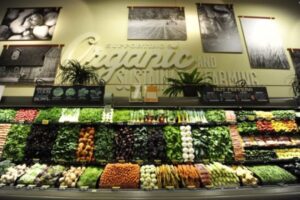Whole Foods Launches New Produce Rating System For Greater Transparency

In an effort to increase transparency about the source and quality of its products, Whole Foods Market recently unveiled a comprehensive new in-store rating system for produce and flowers.
Similar to the previously launched rating systems for household products and meat, the produce rating system will present customers with a three-tier rating system and begin displaying ratings of “good,” “better,” and “best” throughout produce and floral departments. The ratings are based on each brand or farm’s performance on important sustainability topics, including farmworker welfare, pollinator protection, pesticide use, water conservation and protection, recycling, and packaging.
Whole Foods hopes that in addition to helping its customers make more informed decisions, the ratings system will also encourage more farms to engage in responsible production by seeking third-party certifications.
“We are driven by our core values and are always looking at ways to enrich our customers’ experience, improve our communities and support our supplier partners,” said Edmund LaMacchia, global vice president of perishables for Whole Foods Market, in a press release. “The new produce ratings will provide deeper transparency to our shoppers, helping them make conscious choices while also celebrating the great work and responsible practices of growers beyond their organic and local efforts.”
With questions about the impact of pesticides on both human and environmental health looming larger every day, some say the new ratings system will help connect more consumers with non-contaminated produce. “The ratings provide an industry-leading approach that eliminates or restricts the most toxic pesticides from the nation’s food supply and provide incentive for growers to measure and reduce other pesticide use,” states the release.
There’s already proof that Whole Foods has enough clout in the agricultural industry to do just that. “Earlier this year, Whole Foods announced that, by 2018, all products in its stores will be required to carry labels identifying whether they contain genetically modified organisms (GMOs). The Non-GMO Project reports that in response to this action, more than 900 manufacturers have begun the process of getting certified as GMO-free, a number that is expected to swell as the labeling deadline approaches,” reports Good Food On Every Table.
Related on Organic Authority:
5 Things You Should (And Shouldn’t) Buy At Whole Foods
Whole Foods Market Takes Huge Stand Against GMOs: Mandatory Labeling by 2018
Image via Whole Foods

